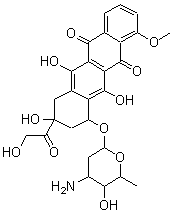Home > Offer to Sell > Pharmaceuticals and Biochemicals > Hormones and synthetic substitutes > Antibiotics Drug Doxorubicin Hydrochloride CAS: 25316-40-9
Antibiotics Drug Doxorubicin Hydrochloride CAS: 25316-40-9
Inquiry
| Post Date: | Dec 10,2016 |
| Expiry Date: | Dec 10,2017 |
| Detailed Description: |
Cas No. :25316-40-9
Quantity: 5Metric Tons Specs:USP Price:1 USD Metric Tons Payment Method: T/T, Western Union, Moneygram, Bitcoin Antibiotics Drug Doxorubicin Hydrochloride CAS: 25316-40-9 Description: Doxorubicin Hydrochloride is the hydrochloride salt of doxorubicin, an anthracycline antibiotic with antineoplastic activity. Doxorubicin, isolated from the bacterium Streptomyces peucetius var. caesius, is the hydroxylated congener of daunorubicin. Doxorubicin intercalates between base pairs in the DNA helix, thereby preventing DNA replication and ultimately inhibiting protein synthesis. Additionally, doxorubicin inhibits topoisomerase II which results in an increased and stabilized cleavable enzyme-DNA linked complex during DNA replication and subsequently prevents the ligation of the nucleotide strand after double-strand breakage. Doxorubicin also forms oxygen free radicals resulting in cytotoxicity secondary to lipid peroxidation of cell membrane lipids; the formation of oxygen free radicals also contributes to the toxicity of the anthracycline antibiotics, namely the cardiac and cutaneous vascular effects. Specifications: Product name: Doxorubicin hydrochloride Synonyms:Adriamycin Usage: Topoisomerase II inhibitor. Antibiotic with cytotoxic actions. CAS number:25316-40-9 Purity:≥99% MW:580.0 MF:C27H29NO11•HCl Appearance: A red-orange, crystalline powder Solubility. Soluble in DMSO to 25 mM and in water to 50 mM Category: Cytotoxic drug Storage: Store at -20°C. Store under desiccating conditions. The product can be stored for up to 12 months. Usage: Breast Cancer Conventional doxorubicin: Treatment (in combination with other antineoplastic agents) of breast cancer. AIDS-related Kaposi’s Sarcoma Conventional doxorubicin: Has been used alone or in combination chemotherapy for the palliative treatment of AIDS-related Kaposi’s sarcoma. Palliative treatment of AIDS-related Kaposi’s sarcoma in adults intolerant to combination chemotherapy or whose disease has progressed while receiving such therapy. Ovarian Cancer Conventional doxorubicin: Has been used in treatment (in combination chemotherapy regimens) of ovarian carcinoma, but other agents currently are preferred. Palliative treatment of metastatic ovarian carcinoma that is refractory to both paclitaxel- and platinum-based chemotherapy regimens (designated an orphan drug by FDA for this use) Bladder Cancer Conventional doxorubicin: Treatment (in combination regimens with cisplatin, methotrexate, and vinblastine) of invasive and advanced bladder carcinoma. Has been used intravesically for treatment of residual tumor and/or as adjuvant therapy for prophylaxis of superficial bladder carcinoma. Evidence is limited, but other agents (e.g. mitomycin, epirubicin) appear to be similar in efficacy but less toxic than doxorubicin and generally are preferred for prophylaxis or treatment of superficial bladder cancer. Small Cell Lung Cancer Conventional doxorubicin: Treatment (in combination chemotherapy regimens) of extensive-stage small cell lung cancer. Other Uses: Conventional doxorubicin hydrochloride: Treatment of solid tumors including thyroid carcinoma, gastric carcinoma, soft-tissue and osteogenic sarcomas, neuroblastoma, and Wilms' tumor; malignant lymphomas of both Hodgkin and non-Hodgkin type; and acute lymphocytic (lymphoblastic) leukemia. Conventional doxorubicin hydrochloride: Treatment of carcinoid tumors, hepatoblastoma†, and retinoblastoma. Conventional doxorubicin hydrochloride: Treatment of Ewing’s sarcoma, squamous cell carcinoma of the cervix and prostate, and uterine cancer. Conventional doxorubicin hydrochloride: Used in combination therapy (with vincristine and high-dose dexamethasone) for refractory multiple myeloma. Although conventional doxorubicin is labeled for use in the treatment of AML,200 208 other agents are preferred. If you have any questions, pls feel free to contact me through below information: Email:debbie at chembj dot com WhatsApp:+8618872220738 |
| CAS Registry Number: | 25316-40-9 |
| Synonyms: | ;Doxorubicin, HCl;(8s-cis)-10-((3-amino-2,3,6-trideoxy-alpha-l-lyxo-hexopyranosyl)oxy)-7,8,9,10-tetrahydro-6,8,11-trihydroxy-8-(hydroxyacetyl)-1-methoxynaphthacene-5,12-dione hydrochloride;(1S,3S)-3,5,12-trihydroxy-3-(hydroxyacetyl)-10-methoxy-6,11-dioxo-1,2,3,4,6,11-hexahydrotetracen-1-yl 3-amino-2,3,6-trideoxyhexopyranoside hydrochloride (1:1);(1S,3S)-3,5,12-trihydroxy-3-(hydroxyacetyl)-10-methoxy-6,11-dioxo-1,2,3,4,6,11-hexahydrotetracen-1-yl 3-amino-2,3,6-trideoxy-alpha-L-lyxo-hexopyranoside hydrochloride (1:1);Doxorubicin HCL;Doxourbicin HCl; |
| Molecular Formula: | C27H30ClNO11 |
| Molecular Weight: | 579.9802 |
| Molecular Structure: | 
|
| Company: | Wuhan Yuancheng Gongchuasng Technology Co.,Ltd [ China ] |
| Contact: | yuyalan |
| Tel: | +8618872220738 |
| Fax: | +86-27-68886696 |
| Email: | sales05c@ycphar.com |
-
Disclaimer statement:The information and data included above have been realized by the enterprises and compiled by the staff, and are subject to change without notice to you. The Chemnet makes no warranties or representations whatsoever regarding the facticity, accuracy and validity of such information and data. In order to ensure your interest, we suggest you chose the products posted by our gold suppliers or VIP members.


